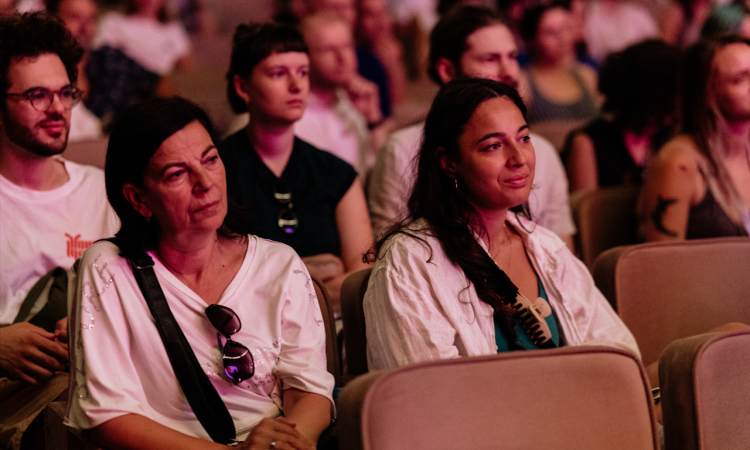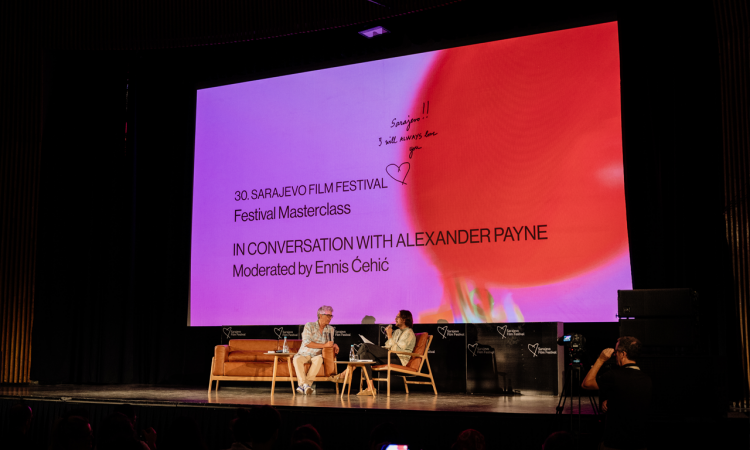News
Oscar Winner Alexander Payne Holds Masterclass: Do I let a film completely take over my life? Of course!
American director and screenwriter Alexander Payne, this year’s recipient of the Honorary Heart of Sarajevo, conducted a masterclass at the 30th Sarajevo Film Festival.
In a packed hall at the Bosnian Cultural Center, the two-time Academy Award® winner discussed his illustrious career, the filmmakers he admires, his vision of cinema, and —Westerns.
“Everyone asks me how I blend humor and drama in my films. I wish that after all these years of hearing this question, I could give a good answer, but I simply don’t have one. You could describe my films as funny dramas or dramatic comedies, but I think we all have a serious side that craves an honest and painful story with a few jokes on the side,” said director Alexander Payne, who came to Sarajevo together with his longtime writing partner Jim Taylor.
“You want the characters in your films to be people you recognize. Characters you feel you could meet in your own life. Bad scripts are those where all the characters have the same rhythm; you can tell they were written by the same person. But in good scripts, every character has their own rhythm,” Payne explained, outlining his cinematic philosophy.
The American filmmaker, who first visited Sarajevo in 2005, will receive the Honorary Heart of Sarajevo tonight, August 18, at the Coca-Cola Open Air Cinema. On this occasion, his award-winning film Sideways, which was also screened at the Festival in 2005, will be shown.
A grandson of Greek immigrants, Alexander Payne grew up in Nebraska, USA. He studied history and Spanish literature at Stanford University before earning a Master’s degree in film direction from UCLA. His eight feature films have been nominated for a total of 24 Academy Awards®, including four nominations for Best Picture and three for Best Director. He has won twice for Best Adapted Screenplay, and his latest film, The Holdovers, garnered the Best Supporting Actress award this year.
“What do awards mean to me? I remember when Jim and I got our first nomination for Election, and my dad called me and said, ‘Don’t let it go to your head.’ I replied, ‘It won’t, Dad, but I want it to go to other people’s heads.’ But even after all these awards, nothing changes - I still have to go back to a blank sheet of paper and start over,” said the director and screenwriter, whose filmography includes Citizen Ruth (1996), About Schmidt (2002), The Descendants (2011), Nebraska (2013), and Downsizing (2017).
Responding to questions from moderator Ennis Ćehić, Payne described how he doesn’t have a vision of the entire film at the beginning of the process; instead, it develops step by step—from the script to casting and location scouting, all the way to filming. But perhaps the most crucial step is the script.
“I just finished The Holdovers, I’m traveling around promoting the film, and people ask me - what’s next? What do you mean, what’s next? I haven’t even sat down to start thinking about it. To make a film, you have to sit down and start writing, spending 5,000 to 10,000 hours crafting a story. Without a chair, there’s no movie,” Payne emphasized, adding that he rarely allows actors to improvise.
“I love my scripts. I want the actors to say my lines word for word. The best compliment I get is when people say the dialogues sound so natural, they seem like improvisation. They’re not. That’s how they’re written,” said the director, who stood up during the conversation to engage more actively with the audience.
He also mentioned that he mostly watches old movies and admires numerous directors, but if he had to choose, he would highlight Frank Capra and Anthony Mann. He also expressed a desire to explore other genres. Although Payne is known for his exceptional comedic dramas, and such projects are most often offered to him, he confessed to the audience that he would love to make a good car chase film, a detective movie, or a Western. In fact, Payne admitted, he is currently working on a Western.
Whether he will actually make a Western remains uncertain. Filmmaking, especially securing financing, is not an easy task. That’s why Payne prefers low-budget productions, as they offer more creative freedom and fewer demands from producers.
“Do I let a film completely take over my life? Of course! There’s no other way to make a movie. You dedicate yourself entirely for about nine months or a year, thinking and working only on that. The good thing is that when you’re done, you have some free time for yourself, and you can come to Sarajevo,” said Alexander Payne, the recipient of the Honorary Heart of Sarajevo, who left the stage to a round of applause.








